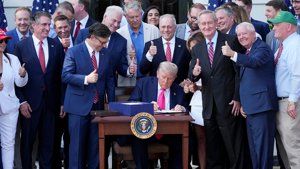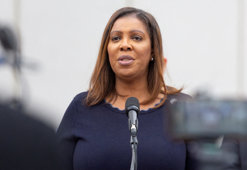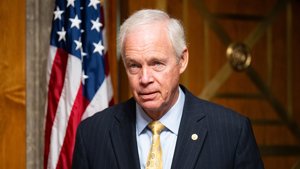
Greene Opposes Trump Bill Over AI Regulation Ban
Rep. Marjorie Taylor Greene now opposes Trump’s signature bill over a 10-year ban on state-level AI regulations.
Greene Regrets Vote, Cites AI Clause in Bill
Representative Marjorie Taylor Greene, R-Ga., a staunch supporter of President Donald Trump, has reversed her stance on the One Big Beautiful Bill Act, citing a provision that restricts state regulation of artificial intelligence. Greene admitted she had not read the entire bill before voting in favor two weeks ago and said she would have voted against it had she known about the AI clause.
The bill, a centerpiece of Trump’s legislative agenda, narrowly passed the House following weeks of late-night debates and internal GOP negotiations. Marketed by Trump as fulfilling key campaign promises—border security, tax relief, and American energy independence—it is now facing resistance from within his own party.
Greene’s objection stems from a specific section in the bill—spanning pages 278–279—that bars states from enacting or enforcing AI regulations for a decade. The provision states that no state or political subdivision may “limit, restrict, or otherwise regulate” AI systems in interstate commerce during that period.
“Full transparency, I did not know about this section,” Greene posted, calling the language a violation of states' rights. “I am adamantly OPPOSED to this… I would have voted NO if I had known this was in there.”
Party Discord and Fiscal Concerns Intensify
Greene joins a growing list of Republicans expressing post-vote regret. Rep. Scott Perry, R-Pa., also voiced concerns, stating that House leadership had ignored early warnings from the Freedom Caucus. “We expect MASSIVE improvements from the Senate,” he said.
Adding to the criticism is Elon Musk, former head of the Department of Government Efficiency (DOGE) under Trump. Free from his government role as of last week, Musk described the bill as a “disgusting abomination” and lambasted lawmakers who supported it.
White House Press Secretary Karoline Leavitt responded to questions about Musk’s comments, reaffirming President Trump’s commitment to the legislation. “This is one big, beautiful bill, and he’s sticking to it,” Leavitt said.
Concerns extend beyond the AI clause. The Congressional Budget Office (CBO) projects that the bill would cut taxes by $3.7 trillion while raising the deficit by $2.4 trillion over ten years. The national debt, already surpassing $36.2 trillion, continues to rise.
Despite these figures, the White House maintains that the bill is essential for delivering on Trump’s campaign promises. However, internal GOP tensions and the Senate's anticipated revisions suggest the bill will face significant changes before any final passage.
Greene has pledged to vote against the bill when it returns to the House if the AI language remains unchanged. “We have no idea what AI will be capable of in the next 10 years,” she warned. “Giving it free rein and tying states' hands is potentially dangerous.”
The Senate is now under pressure to amend the bill, with Republicans signaling they will not support it in its current form. As debate intensifies, the future of Trump’s flagship legislation remains uncertain.






